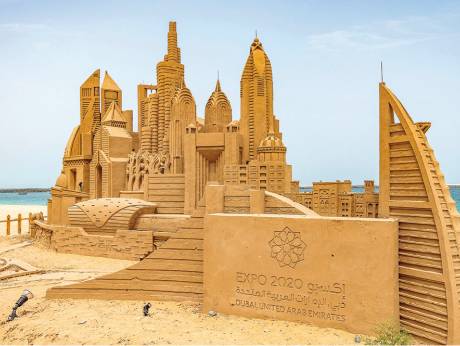As new stock continues to enter the market in the lead-up to the World Expo 2020, developers and agents remain optimistic of the long-term prospects and how the emirate’s development pipeline will ultimately underpin the real estate requirements of Dubai, particularly after the Expo.
“Nearly 200,000 people move to Dubai on a yearly basis. Consequently, these newcomers will require no less than 100,000 units to live in, which will provide investors with sustainable streams of tenants,” says Muhammad Binghatti, CEO and head of architecture of developer Binghatti Holding. “We firmly believe in the Dubai market, and many of the recent economic and legislative reforms are expected to attract more expats to the emirate, thus contributing to the absorption of the current supply.”
Some 13,800 apartments and more than 7,800 villas and town houses were handed over in Dubai last year. From January to August this year, some 14,000 residences have been completed, according to the Dubai Land Department, including 10,000 apartments, 1,575 villas and 2,258 town houses. Binghatti says these numbers are in tune with the current and future demand of the market.
Market concerns
“Dubai has witnessed a population growth on average of 3 per cent per year, which should allow absorption of the current residential supply in the Dubai property market,” says Binghatti.
Sameer Lakhani, managing director of Global Capital Partners, points out that many concerns in the market are partly caused by a tendency to overestimate the amount of supply that will enter the market. “The launches have slowed down in response to market conditions, and demand is starting to shift to ready units,” says Lakhani. “The market is already responding to the concerns that have been raised, and accordingly appears to be overcompensating for downside risk.”
Lakhani also points out that the number of developers in Dubai has halved since 2007, a trend seen in other mature such as the US, where he says the number of developers has reduced by over 55 per cent in the last decade. In Dubai, this has resulted in the emirate’s top five developers accounting for nearly 50 per cent of all supply. Accordingly, this has had an effect in managing real estate stock.
“This level of concentration indicates that supply will be well managed in most emerging communities,” says Lakhani. “In areas where there appears to be less concentration by the larger players such as Sports City, Jumeirah Village Circle, Majan, Arjan and Liwan, there appears to be an increase in transactional volume and prices, indicating that smaller developers have not been able to meet the demand that is emerging in these areas.”
Role of government
Vijay Doshi, managing director of Vincitore Real Estate Development, says the government plays a critical role in stimulating developer activity. “Recent announcements of 100 per cent business ownership in non-free zone areas and longer-term visas for certain categories are all measures to attract top-quality talent,” says Doshi. “When top talent is attracted, giving them choices can only further strengthen their resolve to stay.”
Niall McLoughlin, senior vice-president of Damac Properties, concurs: “We’re encouraged to push through with our developments because the UAE has adopted positive real estate policies and regulations. These policies and regulations provide consumers with the necessary peace of mind and continue to attract investors looking for ready-built properties as well as off-plan real estate investments.”
While several real estate projects are seeking to capitalise on any Expo-related boost in the market, Binghatti says it is important for developers to understand how the Expo will impact different real estate segments. “Expo 2020 is a highly important catalyst for Dubai’s economy,” he says. “The event will create many employment opportunities and will attract top professionals from all continents, creating an expected 300,000 new jobs between 2018 and 2021. As a result, the demand for affordable housing will rise even more in the coming years.”
And while the Expo provides a significant push in real estate development, Binghatti says developers are counting more on its impact beyond 2020. “Even after the conclusion of the event, growth in the real estate sector will remain healthy,” says Binghatti. “The residential sector will mainly witness growth, as mixed-use developments enter the pipeline and the government rolls out its affordable housing programme. After Expo 2020, we see many positive engines of growth. Dubai is putting all the proper steps in place to attract more expatriates and achieve more demand.”
All rights reserved to the initial publisher for Gulf News
Collected and published by Arms &McGregor International Realty® editorial team. Get in touch with us at [email protected].

